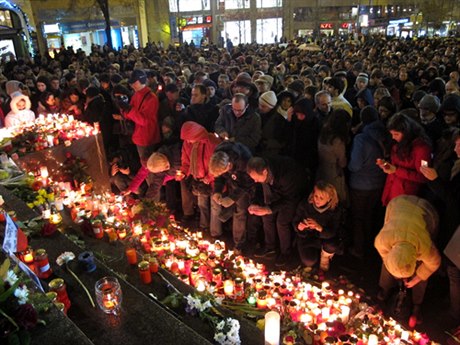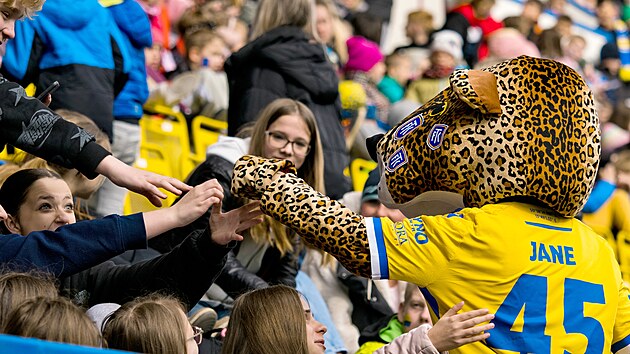In the wake of the past and present world leaders and the Czech elite, it will be the turn of ordinary Czechs to formally pay tribute to Václav Havel from Monday.
The coffin and remains of the dissident leader and man who piloted the non-violent collapse of Communism will be transported to Prague on Monday from his country home in the north of the country, where he died, aged 75, on Sunday morning.
The coffin of the first post-communist president of Czechoslovakia and the Czech Republic will be displayed at Prague Crossroads, a converted church in the center of the capital, from noon Monday and through Tuesday, later being moved to Vladislav Hall at Prague Castle, the seat of the presidency, on Wednesday and Thursday. The funeral is expected to take place on Friday.
The reconstruction of the church and conversion into an international spiritual center was the most ambitious project undertaken by VIZE 97, the foundation created by Havel and his wife, Dagmar.
Czechs have not waited to follow the plot of the official formalities to pay their tribute to the respected worldwide figure. Young and old alike congregated to light candles under the statue of St Wenceslas in Prague’s symbolic Wenceslas Square after the news of Havel’s death filtered out on Sunday. As well as the candles, photographs of Havel and posters proclaiming his motto “truth and love will prevail over lies and hatred,” were displayed on the giant equestrian statue dominating the square.
Candlelight commemorations
It was in that square that the series of massive demonstrations that sounded the death knell of the Communist regime took place in November 1989 with Havel eventually addressing the jubilant crowds from a balcony above the square.
Hundreds of candles have also been placed at the tradition memorial in the center of Prague to the student demonstration on November 17, 1989, whose brutal suppression sparked the wave of protests against the more that 40-year old regime known as the Velvet Revolution. Similar commemorations have taken place in regional towns and cities nationwide.
‘Like millions around the world, I was inspired by his words and leadership...’
Most Czech newspapers just bore photographs of Havel on their front pages on Monday and the dates of his birth and death, with some devoting their entire issues to him. The broadsheet Lidové noviny plans to print a 119-page special edition in Havel’s honor on Thursday.
The tributes from international leaders, past and present, were warm and fulsome. US President Barack Obama said he was deeply saddened to learn of Havel’s death. “Like millions around the world, I was inspired by his words and leadership,” he said, adding that Havel had been a friend to America and “all those who strive for freedom and dignity. ”
“Having encountered many setbacks, Havel lived with a spirit of hope, which he defined as ‘the ability to work for something because it is good, not just because it stands a chance to succeed.’ His peaceful resistance shook the foundations of an empire, exposed the emptiness of a repressive ideology, and proved that moral leadership is more powerful than any weapon. He played a seminal role in the Velvet Revolution that won his people their freedom and inspired generations to reach for self-determination and dignity in all parts of the world,” Obama said.
The Dalai Lama, the Tibetan spiritual leader whom many consider to be closest world leader to Havel and who met him in Prague on Dec. 10 when the former Czech president’s frail condition was plain to see, said “the world has lost a great statesman whose steadfast and unflinching determination played a key role in bringing freedom and democracy to the then Czechoslovakia.”
The Dalai Lama also summed up Havel as an “an unassuming and a courageous leader,” adding that perhaps the best tribute to him would be to “work as best we can towards building a more peaceful, open and just world. ”
French President Nicolas Sarkozy described Havel as a a convinced European. “With the disappearance of Václav Havel, the Czech Republic has lost one of its great patriots, France loses a friend and Europe loses one of its wisest men. ”
‘With the disappearance of Václav Havel, the Czech Republic has lost one of its great patriots, France loses a friend and Europe loses one of its wisest men.’
German Chancellor Angela Merkel also emphasized Havel’s determination to put the Czech Republic and former Soviet-bloc countries back in the center of Europe, describing his as “a great European.”
As president, Havel in particular sought to mend problematic relations with Germany, scarred by Czech fears from the Nazi era and the Soviet era portrayal of a rearming West Germany as the main threat to European peace.
On the German side, relations were complicated by the expulsion of around three million German speakers from Czechoslovakia in the immediate aftermath of WWII. One of Havel’s first major international acts was to apologize for the Germans’ expulsions and violence against them in a move that provoked some criticism at home.
British Prime Minister David Cameron said that Havel was a voice that the communist regime simply could not silence. “Europe owes Václav Havel a profound debt. Today his voice has fallen silent. But his example and the cause to which he devoted his life will live on.”
Czechoslovak-born former US Secretary of State Madeleine Albright, who admitted in a radio interview on Sunday that Havel had tried to persuade her to try and follow him in the Czech presidency when he stepped down in 2003, emphasized Havel’s crusade to find good in himself and others. “Amid the turbulence of modern Europe, his voice was the consistent and compelling, endlessly searching for the best in himself and in each of us.”
Slovak Prime Minister Iveta Radičová said he had been one of her great role models. “I can hardly imagine that the fall of the totalitarian regime in Czechoslovakia would have been so smooth if it had not been for Václav Havel,” she said.
The Czech political elite, whom Havel often criticized for failing to live up to his high moral standards and ambitions, also added its tribute. Havel’s successor, and often his political nemesis, President Václav Klaus described Havel as “a symbol of the modern Czech state. “His personality, reputation and efforts fundamentally helped the Czech Republic to join the community of free and democratic states.”
Klaus said he had respected Havel since the 1960s and paid tribute to him for bringing him into the broad-based Civic Forum movement that replaced the communist regime in power after 1989. He described their meetings in the 1990s and occasional “polemics” as “fruitful,” although Havel himself admitted to fearing his regular encounters with the former rightwing finance minister and prime minister.
Czech Prime Minister Petr Nečas said Havel’s personality and prestige meant that the small, central European country had a much greater influence in the 1990s than it would otherwise have had. “He was a symbol, the face of our Republic, and he belongs to the greatest political personalities of the last century and the beginning of this century.”
‘He was recognized worldwide as the most famous Czech. Unfortunately, he was more welcomed and honored abroad than at home.’
Czech Foreign Minister Karel Schwarzenberg, a former chancellor of Havel’s presidential office, said that his old friend had returned Czechs’ pride. “He was recognized worldwide as the most famous Czech. Unfortunately, he was more welcomed and honored abroad than at home. Modest and shy though he was, he stood up for himself in meetings and negotiations with the most powerful people in the world. I just hope that we are now conscious of what a man we had as a fellow citizen and hold him up as an example.”
Schwarzenberg’s comments that Havel was often more popular abroad than at home were all too often true. The problem was that Havel never got out of the habit of speaking the truth, whatever the regime or circumstances, and home truths often make for uncomfortable hearing.




